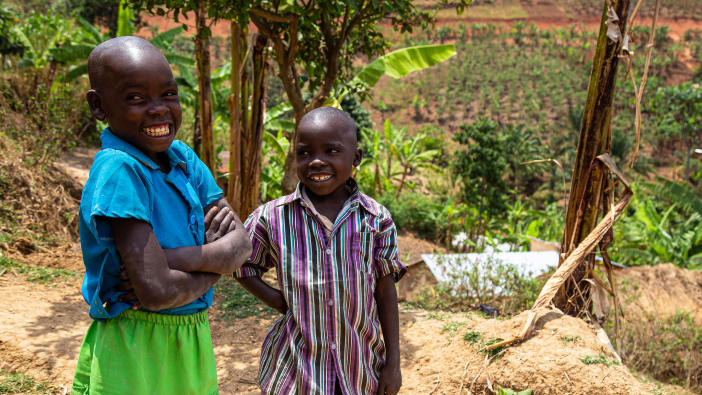Pandemic or poverty?
Millions of people living in poverty around the world are not only facing the risk of the virus, but also going hungry.
Written by Tearfund | 14 Oct 2020



Written by
Written by Tearfund
Lockdowns have put people under unimaginable strain for months. For the millions of people who depend on a daily wage, losing work for just one day – let alone months – leaves them unable to put food on the table.
With no savings or safety net to fall back on, starvation can be a bigger threat to some than coronavirus. And as the pandemic continues, this threat continues to grow.
Facing floods
Mina*, from Mali, has nine children to feed. After losing her husband a year and a half ago, she looks after her own children as well as his children from other marriages.
Before the pandemic, she was already struggling to provide for her extended family on the little money she makes from selling items on the streets. During lockdown, she was no longer able to go out and make money, and her children soon started to go hungry.
‘I started living in depression because of worries,’ she says.
To make matters worse, severe flooding hit her village, destroying part of the family’s home. Mina didn’t know where to turn for help.
‘We were really in need of all basics to survive and worried because we did not know where the salvation would come from. We did not know how we would eat that evening,’ Mina remembers.
In Mali, Tearfund’s local partners have been providing emergency relief. They were able to provide Mina’s family with food, cleaning supplies, and information about how to protect themselves against coronavirus.
‘I could say nothing but thank you. I thought deep down it was a dream, but it is a reality.’
Mina
‘We can only thank you and may God reward you a hundredfold,’ says Mina. ‘You have had mercy on widows and orphans.’
Lockdown with a newborn
In Nepal, Kabita had recently given birth when lockdown hit. Both her and her husband, Gangaram, had stopped work temporarily to look after their newborn daughter.
The couple work as casual labourers, earning a minimal daily wage which barely covers their basic needs. They couldn’t afford to take much time off, so Gangaram planned to go back to work as soon as possible. However, when the government announced a national lockdown due to coronavirus, there was no work to go back to.
Usually, Kabita and her family can only afford to eat one or two meals a day. But now, as their savings and food quickly ran out, even a daily meal for the whole family was impossible.
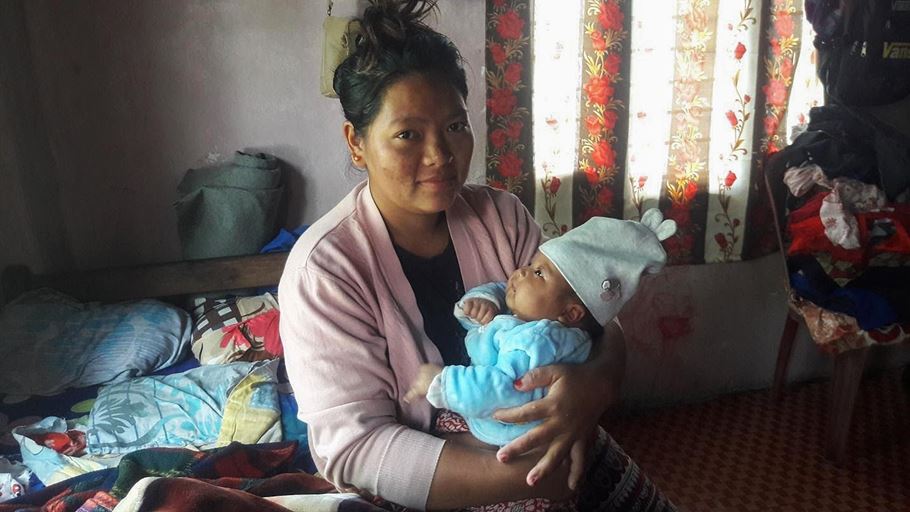
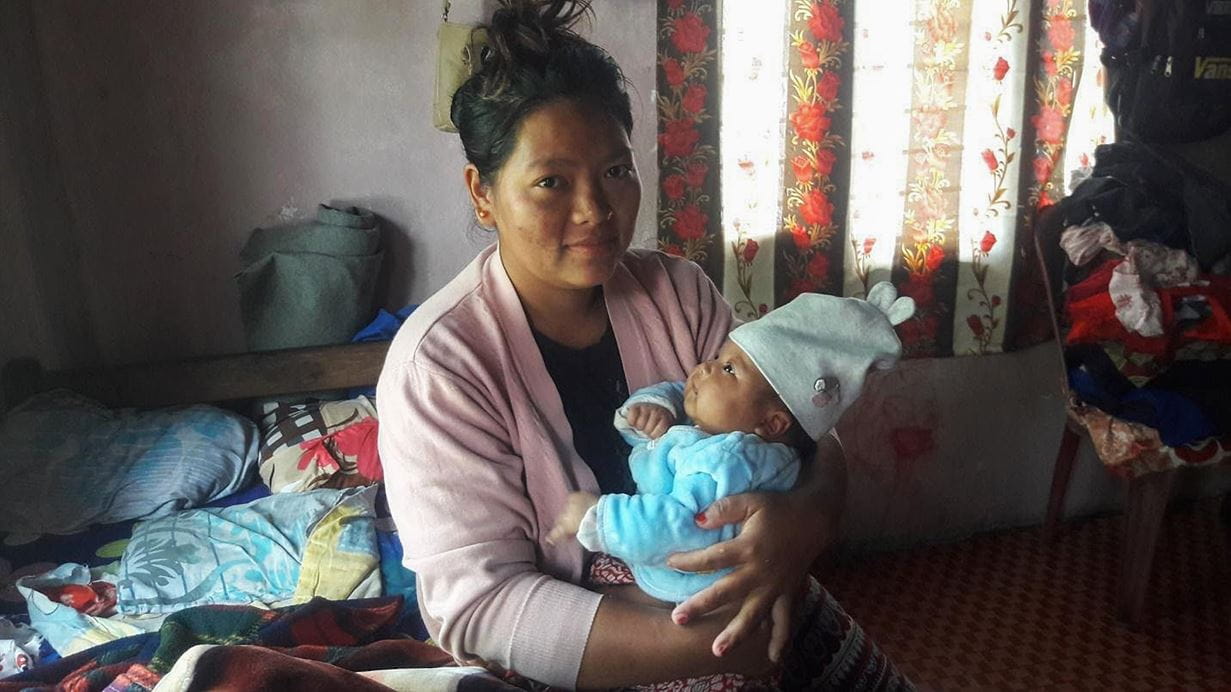
Kabita gave birth to her daughter a few weeks before a national lockdown in Nepal.
Kabita was extremely worried about the health of her baby and her other young daughter as the days with no food turned to weeks. She thought that they would starve if they didn’t get help.
‘It was extremely saddening and difficult for my family to not have anything to eat in our house,’ says Kabita. ‘I know that I should be taking care of my health and eating nutritious food, but that is currently unimaginable as providing sufficient food to our two daughters alone is proving to be a luxury we cannot afford.’
Before things got critical, Kabita and her family received a food package from one of Tearfund’s local partners as part of our emergency coronavirus response. Kabita was extremely grateful, but her concerns for her children remain as she looks to an increasingly uncertain future.
Short-term solutions such as food packages are vital for families like Kabita’s to be able to survive unexpected events, but the pandemic is now a long-term problem which needs a long-term solution.
‘The challenge [in Nepal] continues as unemployment has exponentially increased,’ says Pranaya Chhetri, who oversees Tearfund’s work in Nepal. ‘The lockdown of three months has caused even more people to lose their jobs and bread for their families. Therefore, creating economic and livelihood opportunities for those impacted families, in the long run, is one of the priority areas of intervention.’
The choice of food or medicine
In another area of Nepal, Geetu* was missing out on her regular medications as well as meals. After losing her job at a local school during lockdown, Geetu was unable to afford food for her two children. She couldn't even consider buying the medication she had been on for depression for the past two years. As lockdown continued, her mental health started to deteriorate.
Geetu was able to receive some emergency food packages from the local government. However, without her medication, she was struggling with panic attacks, feelings of hopelessness, and mood swings. This also, inevitably, had a negative impact on her young children.
A faith leader in the community was able to alert Tearfund’s local partner to Geetu’s needs. Our partner immediately went to assess Geetu, and helped her get access to the medications she needed. They were also able to arrange for her to have regular counselling sessions.
Geetu’s panic attacks have stopped, and she finds the counselling to be a great support during this challenging time.
Pushed back into poverty
For those taking brave steps to lift themselves out of poverty, the pandemic has had devastating effects and, in many cases, forced them back into poverty and debt.
Aida*, from Ethiopia, had recently started her own business making and selling injera – a flat pancake made from teff flour.
After spending years living hand-to-mouth working in a hotel laundry, Aida had joined a self-help group run by a local Tearfund partner in her community.
The group inspired and supported her to set up her own business, loaning her the money she needed to get started. Her pancakes were popular, and Aida soon started expanding. However, the pandemic put an end to her progress.
‘The travel restriction and stay at home orders made by the government has caused all my dough that I prepared to get spoiled,’ says Aida. ‘Its impact is becoming far-reaching and affecting my daily income and forcing my business to shut down.’
During the pandemic, the price of the flour Aida uses to make her pancakes has risen by almost 50 per cent, making it almost impossible for her to make a profit. No longer able to pay back her loan, her business stalled and her debts increased.
Fortunately, the self-help group has been able to support Aida with an additional loan to restart and strengthen her business. After months of hardship, things are starting to slowly improve.
An ongoing response
Despite the challenges people are facing around the world, there are stories of hope – of people receiving the help they need, of the local church mobilising resources and supporting their communities.
Since the beginning of the pandemic, Tearfund has been working with local partners in 36 countries to respond quickly to the urgent needs of the most vulnerable communities.
So far, we have been able to distribute over 10,000 food packages to those going hungry.
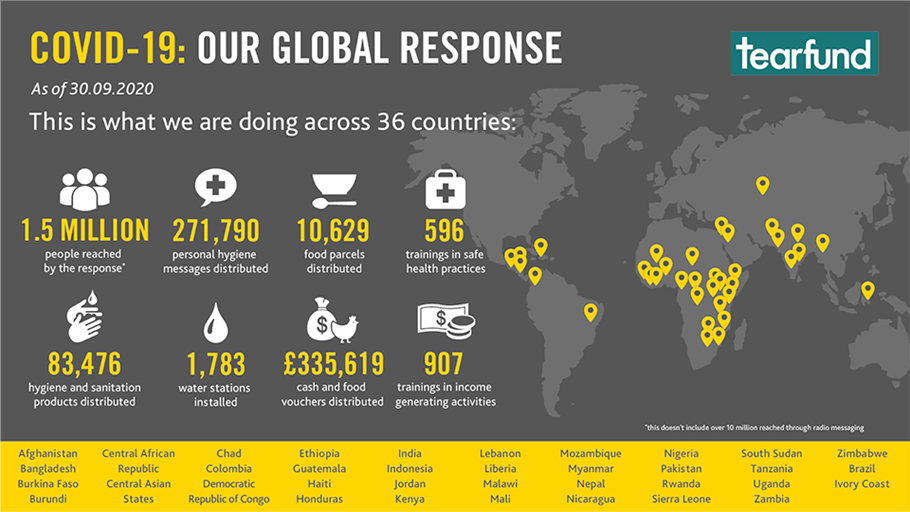
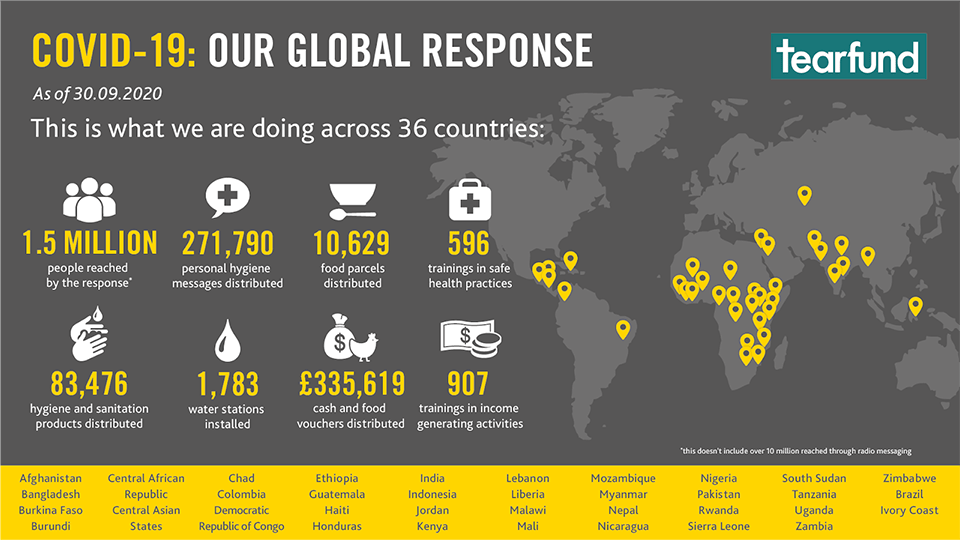
Tearfund is responding to the coronavirus pandemic in 36 countries.
As the crisis continues, our teams on the ground are committed to providing ongoing support to those in need. ‘We are thankful for the prayers and generosity of our supporters which enables us to respond quickly and provide long-term support to vulnerable communities,’ says Pranaya Chhetri. ‘It is so encouraging to know that our supporters are praying for us as we navigate new challenges.’
Please pray
Father God,
We lift up all those around the world who are unable to work or who have lost jobs due to the pandemic. We pray that you will provide for them in their time of need. We ask that you will give them your peace, which is beyond understanding, during this very stressful time. Thank you for our local partners and churches around the world; please continue to guide them to those who are most in need.
In Jesus’ name we pray, amen.
*Names have been changed to protect identities
Similarly Tagged Content
Share this page
Share this page to spread the word and help support those in need.

Get our email updates
Learn about our work and stay in touch with Tearfund. Hear about our news, activities and appeals by email.
Sign up now - Get our email updates




